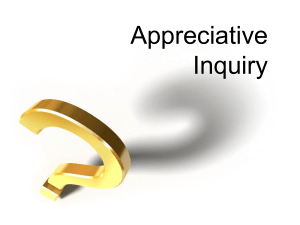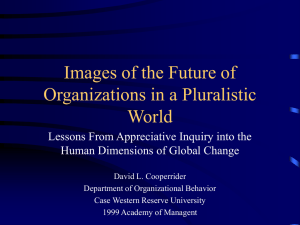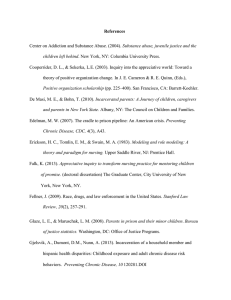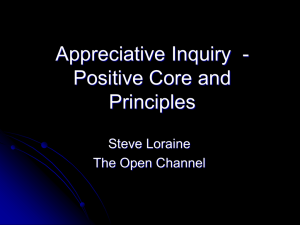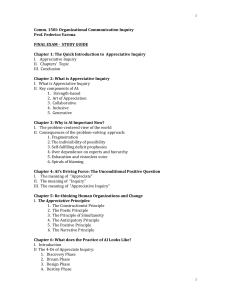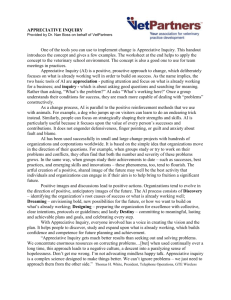756whatisai
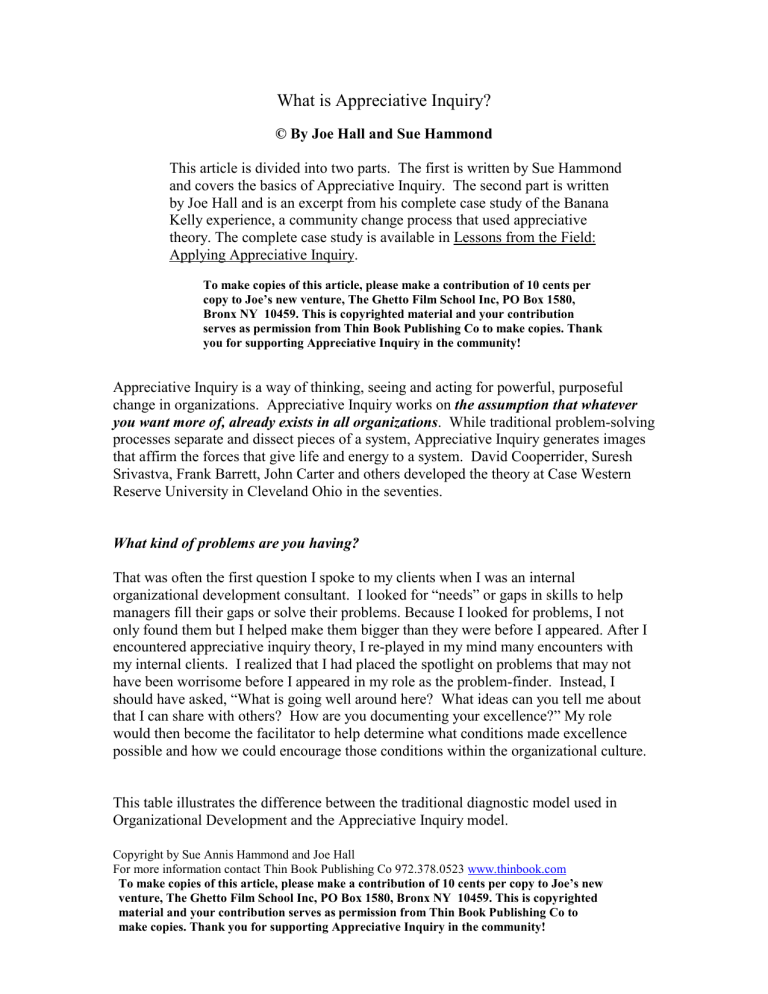
What is Appreciative Inquiry?
© By Joe Hall and Sue Hammond
This article is divided into two parts. The first is written by Sue Hammond and covers the basics of Appreciative Inquiry. The second part is written by Joe Hall and is an excerpt from his complete case study of the Banana
Kelly experience, a community change process that used appreciative theory. The complete case study is available in Lessons from the Field:
Applying Appreciative Inquiry.
To make copies of this article, please make a contribution of 10 cents per copy to Joe’s new venture, The Ghetto Film School Inc, PO Box 1580,
Bronx NY 10459. This is copyrighted material and your contribution serves as permission from Thin Book Publishing Co to make copies. Thank you for supporting Appreciative Inquiry in the community!
Appreciative Inquiry is a way of thinking, seeing and acting for powerful, purposeful change in organizations. Appreciative Inquiry works on the assumption that whatever you want more of, already exists in all organizations . While traditional problem-solving processes separate and dissect pieces of a system, Appreciative Inquiry generates images that affirm the forces that give life and energy to a system. David Cooperrider, Suresh
Srivastva, Frank Barrett, John Carter and others developed the theory at Case Western
Reserve University in Cleveland Ohio in the seventies.
What kind of problems are you having?
That was often the first question I spoke to my clients when I was an internal organizational development consultant. I looked for “needs” or gaps in skills to help managers fill their gaps or solve their problems. Because I looked for problems, I not only found them but I helped make them bigger than they were before I appeared. After I encountered appreciative inquiry theory, I re-played in my mind many encounters with my internal clients. I realized that I had placed the spotlight on problems that may not have been worrisome before I appeared in my role as the problem-finder. Instead, I should have asked, “What is going well around here? What ideas can you tell me about that I can share with others? How are you documenting your excellence?” My role would then become the facilitator to help determine what conditions made excellence possible and how we could encourage those conditions within the organizational culture.
This table illustrates the difference between the traditional diagnostic model used in
Organizational Development and the Appreciative Inquiry model.
Copyright by Sue Annis Hammond and Joe Hall
For more information contact Thin Book Publishing Co 972.378.0523 www.thinbook.com
To make copies of this article, please make a contribution of 10 cents per copy to Joe’s new venture, The Ghetto Film School Inc, PO Box 1580, Bronx NY 10459. This is copyrighted material and your contribution serves as permission from Thin Book Publishing Co to make copies. Thank you for supporting Appreciative Inquiry in the community!
TRADITIONAL OD PROCESS
Define the problem
Fix what’s broken
Focus on decay
What problems are you having?
APPRECIATIVE INQUIRY
Search for solutions that already exist
Amplify what is working
Focus on life giving forces
What is working well around here ?
Appreciative Inquiry is a complex philosophy that engages the entire system in an inquiry about what works. The inquiry discovers data that is then analyzed for common themes.
The group articulates the themes and dreams of “what could be” and “what will be.”
What will be is the future envisioned through an analysis of the past. The entire system maintains the best of the past by discovering what it is and stretching it into future possibilities. This differs from other visioning work because the envisioned future is grounded in the reality of the actual past.
I want to emphasize the data-analysis step in the process because often times, it is the difference between a true Appreciative Inquiry and an application of the theory of
Appreciative Inquiry. While both uses are common, the impact of each differs greatly.
Although I wrote in The Thin Book™ of Appreciative Inquiry, that you can begin applying the principles anywhere, I want to emphasize that in order to get large system change, you must engage the entire system in the effort. Grass root attempts work but only to a limited degree. In our book, Lessons From the Field: Applying Appreciative
Inquiry, we have examples of both, large system change efforts and application of AI through grass root efforts.
The best way I know how to communicate the basics of AI in a short period of time is to introduce the principles of AI (see Srivastva & Cooperrider, 1990) translated into assumptions. Assumptions are the “rules” that a group follows to make decisions about their behavior or performance (see Argyris 1974,1993, for more on assumptions). Many times, assumptions are unspoken or operating at an unconscious level. Senge termed a set of working assumptions a mental model. I believe that the key to all change efforts is the surfacing and examination of working assumptions.
The assumptions of Appreciative Inquiry are:
1. In every society, organization or group, something works
2. What we focus on becomes our reality.
Copyright by Sue Annis Hammond and Joe Hall
For more information contact Thin Book Publishing Co 972.378.0523 www.thinbook.com
To make copies of this article, please make a contribution of 10 cents per copy to Joe’s new venture, The Ghetto Film School Inc, PO Box 1580, Bronx NY 10459. This is copyrighted material and your contribution serves as permission from Thin Book Publishing Co to make copies. Thank you for supporting Appreciative Inquiry in the community!
3. Reality is created in the moment and there are multiple realities.
4. The act of asking questions of an organization or group influences the group in some way.
5. People have more confidence and comfort to journey to the future (the unknown) when they carry forward parts of the past (the known).
6. If we carry parts of the past forward, they should be what is best about the past.
7. It is important to value differences.
8. The language we use creates our reality.
This set of assumptions may look reasonable to you but the application of the set may be a challenge. For example, Assumption 4 counters the traditional social research model that the researcher can remain a neutral observer or interviewer. I believe that our very presence in the group changes the group dynamics in some manner. Also the way we word questions influences the group in some manner (assumption 8).
Imagine the Possibilities
Imagine if your job is to help people and organizations find what they are very good at and help them take action to do more of what they do well? Or imagine structuring who you are based on what you do well instead of trying to change who you are (see Miller)?
Or imagine a psychologist working with you in three sessions to make significant progress in your battle with bulimia (see George et.al)?
All of this is happening in organizations, communities and within individuals.
Organizations know it as Appreciative Inquiry; communities call it Asset-Based
Development or Appreciative Planning & Action; individuals know it as Solution-
Focused Therapy or Brief Therapy.
I can only speak with experience as an organizational consultant but I know that all of us who are using this philosophy are thrilled with the results. We are excited to see that we can help others create a better workplace, community or lifestyle by looking at what works and determining how to do more of what works. When you do more of what works, the stuff that doesn’t work goes away. This is almost heresy to our problemsolving identities (or as Joe calls it, the assembly line mental model) and we all have felt the resistance. In one Fortune 50 organization, the president heard about AI and with a few choice words reminded people that the only way they ever learned anything was by solving problems. Another Fortune 50 organization adopted appreciative theory with a first step of learning how to ask questions from a positive frame. They didn’t include the data analysis but it is a start.
Appreciative Inquiry truly honors the past and that is another reason it is a wonderful way to help people manage change. Those of us who use it often use the work; “magical” when we describe the power we have experienced. The magic comes from the great
Copyright by Sue Annis Hammond and Joe Hall
For more information contact Thin Book Publishing Co 972.378.0523 www.thinbook.com
To make copies of this article, please make a contribution of 10 cents per copy to Joe’s new venture, The Ghetto Film School Inc, PO Box 1580, Bronx NY 10459. This is copyrighted material and your contribution serves as permission from Thin Book Publishing Co to make copies. Thank you for supporting Appreciative Inquiry in the community!
relief from participants that the message isn’t about what they’ve done wrong or have to stop doing. It is an affirmation that much is well and ready to be nurtured.
An Example
Enough theory, how about an example? The example is excerpted from Lessons from the
Field: Applying Appreciative Inquiry, the first book by practitioners for practitioners describing what we learned as we used Appreciative Inquiry. Joe describes how the underlying theory of appreciative inquiry is used in a community effort in the South
Bronx.
The Banana Kelly Experience
How an Organization Lives a Youth-Centered Commitment
Background
The Banana Kelly organization began in 1977, when thirty residents gathered to stop the demolition of their homes along the banana-curved block of Kelly Street in the South
Bronx. Founded, owned and governed by local people the organization today employs over 100 full-time staff members (90% community residents) and operates programs in housing, economic development, and education. Projects include Youthbuild, Home
Instruction Program for Preschool Youngsters (HIPPY), school-based family support in three junior high schools, and a Banana Kelly Community Learning Center public high school. We are also developing the Bronx Community Paper Company (BCPC) which will create 600 onsite permanent jobs while advancing environmentally sound technologies. In 1996, from over 800 nominations worldwide, the United Nations recognized Banana Kelly with one of six Gold Medal Best Practices awards for
Improving the Living Environment.
Young people are an integral part of the Banana Kelly community, and some 35% of the organization's full-time employees are under the age of 23 years working in all areas of housing, economic development, education and administration. Historically their contribution is significant in rebuilding the South Bronx. We are in our third generation of youth leadership working side-by-side with adults in a wide variety of projects. One example is Yolanda Rivera, our board chair, who started community development work as an 11 year old girl translating in housing court for her parents, neighbors and other tenants fighting to reverse the destruction of the neighborhood. Early on in this 30 year rebuilding effort there were limited, if any, funds available for youth programs. This deficiency thereby focused youth activity and attention towards family, schools, and
Copyright by Sue Annis Hammond and Joe Hall
For more information contact Thin Book Publishing Co 972.378.0523 www.thinbook.com
To make copies of this article, please make a contribution of 10 cents per copy to Joe’s new venture, The Ghetto Film School Inc, PO Box 1580, Bronx NY 10459. This is copyrighted material and your contribution serves as permission from Thin Book Publishing Co to make copies. Thank you for supporting Appreciative Inquiry in the community!
action movements within the systems that affected their own lives and those of their families, friends and neighbors. Youth, like Yolanda, were in the room with adults -listening and participating in conversations -- and being an integral part of what would eventually transform this part of New York City.
Appreciative Inquiry
An innovative organizational development intervention called Appreciative Inquiry (AI) is being shared throughout the world by Dr. David Cooperrider and his colleagues at the
Weatherhead Graduate School of Management at Case Western Reserve University.
Several Banana Kelly people have been through the AI executive certificate training, and we also completed the 1996 Organizational Excellence Program (OEP) with partners in our Americans for Better Communities network. The kinship-based relationships found in our organization create a cloth of network associations that strengthens our community. Given these multiple, interwoven and seemingly invisible layers of relationships within the Banana Kelly learning community, the AI organizational development strategy eventually found its way into our personal, family and neighborhood lives.
Appreciative Inquiry -- with its four “D” cycle of Discover, Dream, Design and Delivery
-- has provided us with some important insights and breakthroughs with regard to our youth development work. Reaffirming that the quality of our language -- how we talk about our work our relationships and ourselves with each other (see Assumption 8) -- in conversations with youth was not only important for them but also a gauge on where we are as an entire community. Much of our work with young people is consistent with the
Discovery phase of AI: problem-solving or need identification gives way to conversations that value the best of “what is working well." The power of the question and how it is posed (in relation with them, not to them) takes youth in a direction where inquiry and change happen simultaneously (see Assumption 4). They begin to name the process and pose questions for themselves -- where they live and work -- which moves them through a continuous learning and growth process. Over time these conversations, along with an inventory tool and other exercises, begin to work to surface assets, capacities and most importantly positive images that create a life-long learner. The enhanced imaginative capacity that flows from this relational process builds engaged, alert, self-aware, conscious young citizens prepared for a 21st century where softer skills like effective team participation and an intimate, informed understanding of one’s own learning style is required.
Most adults will not introduce future hopes, dreams and aspirations into our practice with urban youth, lest we be accused of being so irresponsible by not dealing with the reality at hand such as the violence, drugs, and oppression that plagues their world. Help professionals are trained to work “where the client is at,” through incremental, doable small steps so as not to discourage them from one more devastating failure or setback. I would argue that a caring, mutual learning relationship that is consciously building
Copyright by Sue Annis Hammond and Joe Hall
For more information contact Thin Book Publishing Co 972.378.0523 www.thinbook.com
To make copies of this article, please make a contribution of 10 cents per copy to Joe’s new venture, The Ghetto Film School Inc, PO Box 1580, Bronx NY 10459. This is copyrighted material and your contribution serves as permission from Thin Book Publishing Co to make copies. Thank you for supporting Appreciative Inquiry in the community!
community actually encourages that same young person to take more risks and bask in the luxury of their very own special mistakes. Dreams are not necessarily born from or nurtured by our successes, and failure even in its most dramatic form does not necessarily knock a person out. It is how that experience is reflected upon, talked about, defined, and the reality we co-create that ultimately makes it positive or negative (See assumptions 2,
3) . I have seen young people at Banana Kelly time and time again do amazing work and push everyone's idea of what is possible through great acts of kindness delivered on
South Bronx street-corners, meetings with corporate executives and foundation officials, and training sessions with their peers in Mexico, Turkey and Germany. Each and every one of these precious stars could easily be defined by a professional diagnosis as "atrisk." Each and every one.
Measuring Outcomes
We are honestly struggling with outcomes, more specifically how to name them and fully capture the broad set of experiences. Measuring the quality and impact of relationships, and sharing that with others so that they too may learn from the experience, has not been easy. We can measure basic skills, attendance, and other indicators but young people are not entering the Banana Kelly community always knowing up-front exactly what they will come out with later. This has been very limiting for some and a challenge for all of us. Throughout the process youth continue to create opportunities for themselves and others. During a 1995 visit to Los Angeles, young Banana Kelly leaders formed a vision and created our Community Learning Institute (CLI) which brought five young men from
Los Angeles for a four month living/learning experience in our community. The CLI has hosted artists from Mexico and currently two graduate student interns from a university in Hamburg, Germany. While we never anticipated or worked towards these opportunities, we were able to realize the benefits when they became available.
The most profound thing we do for young people at Banana Kelly is show them the high expectations we have for their greatness, while being careful not to be drawn-in to the low-vision reality the rest of their world may hold for them (See assumptions 3, 5).
Young people started Banana Kelly in a very organic way, so that our work today is not an “add-on” or a program initiative. This fact is something that we declare to the world as recognition of their contribution, never taking this for granted. Work with youth occurs by meeting organizational goals, which get met through the youth development agenda. A youth-centered commitment is about them growing and thriving in the process
-- the ends are the economic and community development outcomes, which they deliver for themselves and their neighbors. This is contrary to everything they may have experienced up to this point, since their education has operated from a foundation that sees them as empty vessels to be filled with information. But as with most situations young people bring a curious, gutsy daring to the mix that makes all kinds of success possible. Leaders in their early twenties run Banana Kelly projects that have enormous impact, accounting for hundreds of thousands of dollars.
Copyright by Sue Annis Hammond and Joe Hall
For more information contact Thin Book Publishing Co 972.378.0523 www.thinbook.com
To make copies of this article, please make a contribution of 10 cents per copy to Joe’s new venture, The Ghetto Film School Inc, PO Box 1580, Bronx NY 10459. This is copyrighted material and your contribution serves as permission from Thin Book Publishing Co to make copies. Thank you for supporting Appreciative Inquiry in the community!
Development for an individual or community never plays out in a linear process, though the organizations we have inherited from the industrial revolution continue to perpetuate assembly line mental models. The Banana Kelly experience draws a developmental model that is much more free-flowing. There is constant movement in our young leaders’ daily lives all over a continuum of developmental success and setbacks that challenge all of us in profound ways. The metaphor of the hammock -- with its strength, ability to swing back and forth, and flexible supportive structure that wraps around the person -- allows us to see this movement through a more receptive lens. Since our organizational design is not structured around rigid bureaucratic accountability and control, or looking for outcomes grounded in the prevention of something bad, we can see the person. Building quality people builds quality solutions to everything we need -- the strength-based approaches give a practice and supportive infrastructure that makes this happen.
Given the dynamic acceleration of change present in the world today, and if our work with young people is to be successful in preparing them for that demanding environment, a dramatic overhaul of our organizational, institutional, and community structures is required. Therefore assets-based development and appreciative inquiry ultimately hold great promise for people, as well as their organizations and communities. We know that the true power of AI and the assets based movement has yet to fully emerge, and that the potential these concepts hold will be unleashed when informed by the personal, spiritual and communal places found within ourselves -- places that do not separate work from family, professionals from community or practice from values.
Recently, we discussed the movie Good Will Hunting . What began to form during the conversations were two distinct schools of thought about what was the defining moment that moved Will to positive change. The visiting professionals thought that Will’s emotional breakthrough with his therapist finally allowed him to heal his past and eventually move to make major changes in his behavior. Local folks here thought it was really cool when Will’s best friend tells him how great he is, wonderfully talented and better than settling for less in their neighborhood. Their relationship allowed Will to hear this loud and clear, giving him the courage to move from his confining existence and on to California. Perhaps the real shift is when Robin Williams (as Will’s therapist) shares with him that Will has made a huge impact on him, affecting him deeply, and thereby redefining the power relationship between professional and client. This makes the tearful breakthrough possible because young Will has felt someone’s unfettered care in a relationship that values his input, knowledge and contribution. But in Good Will Hunting
Part II we now see the therapist as part of a learning community using strength-based approaches, bringing possibilities and literally the whole world to that neighborhood.
Will is back home finding everything he needs to grow and thrive, and making that available for his neighbors. Fiction? Our young heroes here at Banana Kelly live that script every day.
Copyright by Sue Annis Hammond and Joe Hall
For more information contact Thin Book Publishing Co 972.378.0523 www.thinbook.com
To make copies of this article, please make a contribution of 10 cents per copy to Joe’s new venture, The Ghetto Film School Inc, PO Box 1580, Bronx NY 10459. This is copyrighted material and your contribution serves as permission from Thin Book Publishing Co to make copies. Thank you for supporting Appreciative Inquiry in the community!
ABOUT THE AUTHORS
For the last six years Joe Hall has been helping Banana Kelly build its community development model. A resident of the South Bronx, he and his neighbors travel throughout the world sharing their experiences, providing training and the stories that highlight possibilities for others. He served as President of Banana
Kelly, lecturer at Columbia University and holds an executive certificate in appreciative inquiry from Case
Western Reserve University. He is now president of The Ghetto Film School Inc, PO Box 1580, Bronx, NY
10459.
Sue Annis Hammond is an organizational development consultant at Kodiak Consulting, a firm she founded. Kodiak’s work focuses on organizational culture change. She also heads The Thin Book
Publishing Co, which publishes The Thin Book of Appreciative Inquiry and other Thin Books
designed to deliver cutting edge knowledge in an easy to read format. The first field book on Appreciative Inquiry,
Lessons from the Field: Applying Appreciative Inquiry is now available. The Thin Book Publishing Co can be reached at www.thinbook.com
, Phone (972) 378 0523, FAX (972) 403 0065 (888) 316.9544.
Resources
Argyris, Chris, Schon, D. (1974) Theory in Practice. Jossey-Bass. San Francisco, CA.
Argyris, Chris. (1993) Knowledge for Action. Jossey Bass, San Francisco, CA.
Barrett, Frank J.; Cooperrider, David L. (1990) Generative Metaphor Intervention: A
New Approach for Working with Systems Divided by Conflict and Caught in Defensive
Perception. Journal of Applied Behavioral Science V.26, No. 2, p.219.
Barrett, Frank J. (1995) Creating Appreciative Learning Cultures. Organizational
Dynamics V.24, No. 2, p. 36.
Cooperrider, David L. (1996) Resources for Getting Appreciative Inquiry Started: An
Example OD Proposal. OD Practitioner, V.28, No. 1-2, p23.
Cooperrider, David L., Srivastva, Suresh (1987) Appreciative Inquiry in Organizational
Life, in Woodman and Pasmore (Eds.) Research in Organizational Change and
Development, Vol. 1, JAI Press.
George, E., Iveson, C., Ratner, H. (1990) Problem to Solution, Brief Therapy with
Individuals and Families. BT Press: London, Available in the US through the Thin Book
Publishing Co, Plano TX.
Hammond, Sue Annis (1996) The Thin Book of Appreciative Inquiry. Thin Book
Publishing Co. Plano, TX.
Copyright by Sue Annis Hammond and Joe Hall
For more information contact Thin Book Publishing Co 972.378.0523 www.thinbook.com
To make copies of this article, please make a contribution of 10 cents per copy to Joe’s new venture, The Ghetto Film School Inc, PO Box 1580, Bronx NY 10459. This is copyrighted material and your contribution serves as permission from Thin Book Publishing Co to make copies. Thank you for supporting Appreciative Inquiry in the community!
Hammond, Sue, Royal, Cathy. (Eds.) (1998) Lessons form the Field: Applying
Appreciative Inquiry. Thin Book Publishing Co, Plano, TX (out of print at the moment).
Miller, Marlane. (1997) BrainStyles: Change your Life without Changing Who You Are.
Simon & Schuster.
Senge, P. (1990) The Fifth Discipline. Doubleday.
Srivastva, Suresh; Cooperrider, David L. (Eds.) (1990) Appreciative Management and
Leadership. San Francisco: Jossey-Bass. Now reissued by Williams Custom Publishing, available through www.thinbook.com.
Srivastva, Suresh; Fry, Ronald (Eds.) (1992) Executive and Organizational Continuity.
San Francisco: Jossey-Bass.
Copyright by Sue Annis Hammond and Joe Hall
For more information contact Thin Book Publishing Co 972.378.0523 www.thinbook.com
To make copies of this article, please make a contribution of 10 cents per copy to Joe’s new venture, The Ghetto Film School Inc, PO Box 1580, Bronx NY 10459. This is copyrighted material and your contribution serves as permission from Thin Book Publishing Co to make copies. Thank you for supporting Appreciative Inquiry in the community!
